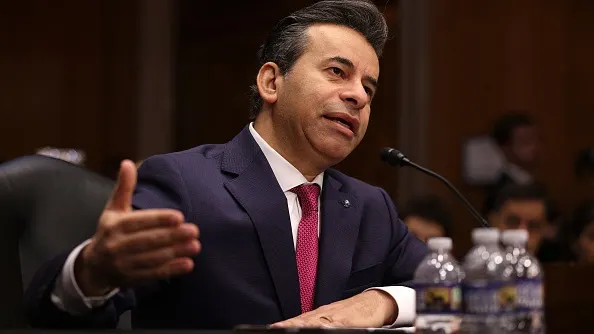
Overview
Despite reductions and restructuring, the FDA is strong and on track to meet its goals, FDA Commissioner Martin Makary, MD, said at BIO.
Makary highlights operational stability, technology adoption and a pilot to cut drug review times
Despite sweeping federal workforce reductions and restructuring, the Food and Drug Administration remains operationally strong and is on track to meet its goals, FDA Commissioner Martin Makary, MD, said at the BIO International Convention on Tuesday, June 17.
Makary detailed the agency’s rapid transformation during a fireside chat with biotech executives and industry leaders. Speaking on the main stage with BIO CEO John Crowley, Makary painted a picture of a regulatory agency looking to cut policies, procedures and rules that contribute to long development times, while infusing new technologies into every stage of the review process.
“Our focus in this FDA is very clear, called a new FDA. We want to use gold standard science and common sense to be able to deliver more cures and meaningful treatments for Americans,” Makary said. “We are willing to challenge deeply held assumptions on how we do things, if it means we can deliver more cures and meaningful treatments, safe and effective to the American people.”
The changes come against a backdrop of major workforce reductions and slashed research budgets across the federal health system, part of broader political and economic shifts reverberating through biopharma and academic science. (Read more: “Mayhem, Destruction and Biomedical Tumult from Trump Cuts”, “Reclaiming U.S. Scientific Leadership: A Wake-Up Call for Innovators”.)
Makary pointed to layers of internal bureaucracy and outdated processes that he believes have slowed drug reviews and lengthened development timelines. He noted that duplicate departments, excessive administrative oversight and rigid procedural requirements often keep applications in limbo and force companies into extended rounds of back-and-forth with regulators.
“We need to modernize and make the FDA user-friendly for both our scientific reviewers and the innovators bringing therapies forward,” Makary said.
The FDA is also ramping up industry outreach with CEO listening events and public hearings on key issues. For instance, at a three-hour roundtable earlier this month, Makary and others from the FDA heard from drug developers, patient advocates and researchers on ways the agency could make it easier to develop cell and gene therapies, including proposals to speed approvals for rare disease treatments, modernize clinical trial designs, and use real-world evidence in regulatory decisions (Read more: “FDA Industry Panel Pushes for Faster Cell and Gene Therapy Reviews”).
“We want to stand before you and listen and hear your ideas on the FDA,” Makary said.
While some in the industry has expressed concern that changes at the FDA and other health agencies under the Trump administration will disrupt timelines and delay reviews and approvals, Makary said that he hasn’t cut any employees involved with scientific evaluations, even as the agency eliminated nearly 3,500 positions in April and faces an 18 percent budget cut for 2026. (Read more: “Drugmakers Brace for Trump-Era Shifts on Tariffs, Manufacturing and Regulation”.)
Still, the changes are necessary, he said, to pare back regulatory rules and guidelines that have created excessive paperwork and communication requirements. The current situation has led to persistent frustration from drug developers.
“A 15-minute call could save a company months of doing guesswork, and honestly, we owe it to our sponsors. This is just good professionalism. It has tremendous benefits to society,” Makary said.
FDA Launches Pilot to Reduce Drug Review Timelines
He also announced the launch of a pilot program to “decouple” manufacturing and clinical data reviews, with the goal of compressing drug review times from a year to just months.
“Now we have a system in this new pilot where we will start that review process. And that way, once the final clinical trial results come in, they can be submitted essentially as an addendum for part two of the application. Then we can focus on review of that in one or two months, getting a decision back to the sponsor instead of the standard 10 to 12 months.”
This push for speed comes as the agency’s ability to meet its own PDUFA deadlines is under scrutiny. The FDA missed several action dates this year, including for high-profile drugs from Stealth BioTherapeutics, Novavax and GSK. Agency-wide AI is now being deployed to cut “non-productive busywork,” but legal analysts have warned of transparency and accountability gaps as more of the review process moves into algorithmic “black boxes.” (Read more: “FDA Sets Aggressive AI Rollout to Speed Drug Reviews”.)
FDA Moves Forward Alternatives to Animal Testing
In another major policy shift, the FDA is moving to phase out most animal testing, a step enabled by the 2022 Modernization Act. Makary said the agency’s new roadmap “marks a paradigm shift,” in drug evaluation. (Read more: “FDA Roadmap Accelerates High-Tech Alternatives to Animal Tests”.)
Makary said these moves and others are part of his broader effort to work in partnership with the industry, while maintaining independence from it.
“The FDA should be in partnership with the industry, not be captured by it,” he said, while “at the same time maintain that that scientific review is impeccably independent.”








